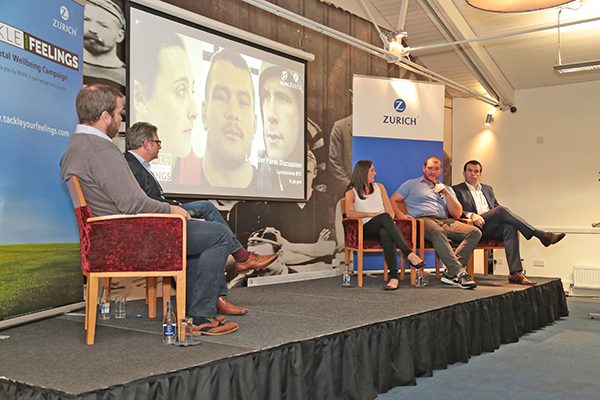
Above: The Irish Rugby Union Players’ Association panel discussion at Lansdowne Rugby Football Club.
The Irish Rugby Union Players’ Association (IRUPA) and Zurich Insurance held a panel discussion at Lansdowne Rugby Football Club, on October 12th, as part of their Tackle Your Feelings campaign.
The campaign is about helping people deal with mental health problems if feeling unable to cope. Dr. Eddie Murphy, a clinical psychologist, well-known from the highly successful show Operation Transformation, was an informative contributor on the night, frequently giving his advice.
Zurich spokesperson, Lorcan Hardy, spoke of getting rugby players to come to an event with salespeople and how they moved the room, and how it lead to conversations afterwards among the salespeople. This was significant, as the work of IRUPA identified mental health as an issue that was holding players back.
Créde Sheehy-Kelly, IRUPA Player Development Manager for Leinster, and Omar Hassanein, the CEO of IRUPA, had the idea of helping their players and at the same time campaigning for better mental health in Ireland. This led them to create the campaign with people such as Dr. Murphy. The idea of giving back is key in this initiative.
Indeed the gratitude of people for that was emphasised by many of the attendees on the night.
Some shocking statistics were laid bare to back up the urgency of the crisis in mental health in Ireland and were put forward by Dr Murphy. He criticised the under-funding of the state mental health infrastructure, stating that this shortfall was exasperating the situation. The amount of money spent on mental health services in Ireland is just over half the E.U. average at 6%. Comparably it is 11% in Britain. Equally troubling was the fact that 51% of students suffered mental health difficulties while in college.
One of the goals of the campaign was to get the message of looking after our mental health into communities. The importance of being able to rely on the support of your friends and family was a key take-away. The speakers on the night emphasised how supportive the locker room could be. The overall message was about acceptance, discussion and taking practical small steps to get through stress.
Two other contributors on the panel included Jack McGrath and Hannah Tyrrell of the Ireland men and women’s rugby teams respectively. Both players experienced mental health challenges while at the top of their game in their sport. Their personal stories were poignant.
McGrath spoke of how many people came up him to relate how they had experienced what he was going through. He told the story of losing his brother, who encouraged him so much in life telling him, “you’ll play for Ireland,” and how burying his feelings about his death was his initial coping mechanism.
He intensified his training focus as a method to block out the grief. Eventually, however, it was too much and he was forced to deal with his grief and depression.
“When you’ve got this knot in your stomach and you’re struggling to get up in the morning, eventually you start talking and it’s nearly like a gas valve releasing.”
Tyrrell told her story of dealing with stress negatively through self-harm and bulimia and how finding the little things in life, taking comfort in friends and above all acknowledging what she was going through, helped her reach a better place. She stated that “the biggest thing for me was that I had to realise that I wanted to get better for myself. As soon as I reached out to my friends and family they were there for me.”

Above: Questions from the audience.
For McGrath and Tyrrell, reaching out and talking to people, whether it be a girlfriend, family or friends, was crucial for them. When asked if they had anything they wanted to say to young people suffering from mental health challenges, both players emphasised that it’s ok to talk and to place their trust in people close to them. This empowered them to find better methods of coping.
Murphy emphasised how mental health issues could happen to anyone: “Big boys do cry and big girls do too.” They were aiming to get the message out to schools, to have people talking about it on car journeys and in the office, in the hopes that people would have conversations about mental health.
Of course this campaign comes at just the right time with the recent loss of beloved Munster coach, and former Munster and Ireland player, Anthony “Axel” Foley, who died tragically at the age of 42. Foley’s death has led to an outpouring of grief in the rugby world as well as wider Irish society. He was much loved and remembered as a passionate man both on the pitch for Munster and Ireland.
Furthering on from the campaign of awareness and prevention it was stated that their ultimate goal was towards a drive for mental health reform. Working with Mental Health Reform, they were working to push the government into more thorough action and significant healthcare reform in order to make up for the problems with services.
This fitted with Director of Mental Health Reform, Dr Shari McDaid’s dream that “everyone with a mental health difficulty can live a [fulfilling] life.”
For those struggling with stress in their day to day lives, Dr Murphy said that the website, tackleyourfeelings.com, can help them find resources and tools, from assessing how well people were coping with stress as well as being giving little ways to help. Additionally, there were resources on the website for further mental health services should people want them.
By Kevin Mac Sharry



